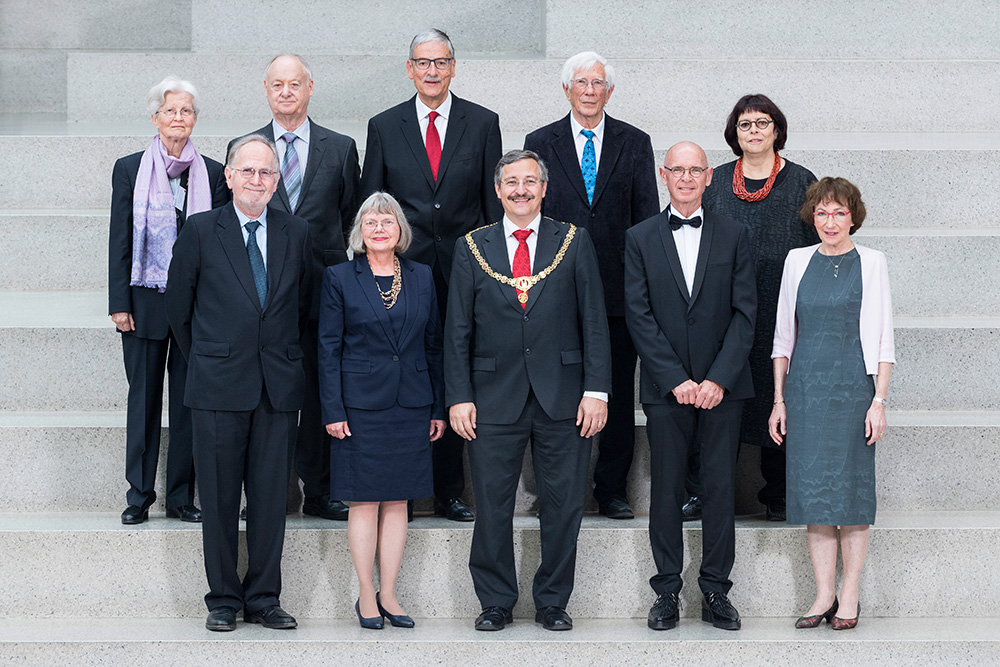Navigation auf uzh.ch
Navigation auf uzh.ch

Numerous personalities from the worlds of academia, politics, industry, and culture gathered at this year’s Dies academicus celebration, which marked the 185th anniversary of the University. The ceremony opened with a speech by Dr. Martin Dahinden, UZH alumnus and Swiss ambassador to the US. Dahinden recalled his tenure as president of the Association of the Non-Professorial Academic Staff of the University of Zurich (VAUZ) – which is celebrating its 50th anniversary – and reflected on the interdisciplinary nature of his studies in economics, saying it is mainly the open-minded, analytical thinking practiced at UZH that remains fresh in his memory: “Over the course of my diplomatic career, I have profited greatly from the breadth of knowledge gained at UZH as well as from the lessons in how to apply it,” Dahinden said. He then made a strong argument for a university culture that educates students to be critical thinkers – rather than simply training them to mechanically regurgitate facts. “Students with a university education should master critical thinking and be capable of challenging the status quo. Their thinking should move beyond current frontiers and explore the unknown.”
The current co-presidents of VAUZ, Oriana Schällibaum and Georg Winterberger, reflected on the 50-year history of the organization established to represent the interests of the non-professorial academic staff. The co-presidents stressed how the responsibilities of the staff have changed markedly with the continual expansion of the University and its mission. And they discussed future challenges – for instance, providing better support for junior academics.
President Michael Hengartner then highlighted some of UZH’s achievements from last year: Enrollments in 2017, at 25,672 students, retained the high level of the previous year, with an increase in the number of students studying STEM subjects and medicine, and more candidates pursuing doctoral study. He also noted the slight increase in third-party funds and designated donations to the University over the past year. Other positive developments include UZH’s admittance to the higher education network “Universitas 21” and new strategic partnerships with Freie Universität Berlin as well as the universities of Prague and Geneva.
The University of Zurich awarded an honorary doctorate to four women and four men:
UZH named Beat Husi, former legal clerk of the Canton of Zurich, a permanent UZH Guest of Honor. The award was conferred for his significant contribution to the legislative framework of the University as well as his for efforts to ensure consistency in its legal terminology. Furthermore, in his role as president of the association “200 Jahre Alfred Escher und Gottfried Keller,” he collaborated with UZH to preserve the historical heritage of the Canton of Zurich.
The 2018 edition of the UZH Teaching Award was granted to Professor Silja Häusermann of the Department of Political Science. The professor of Swiss policy and comparative political economy received the award for her skill in motivating students to critically reflect on current research findings and to challenge the prevailing tendencies.
The 2017 IBM research award for computer modeling and simulation in chemistry and materials science was granted to Corina Keller for her Master’s thesis in chemistry.
Maurizio Taramasso MD of the Department of Cardiovascular Surgery at the UniversityHospital Zurich received the 2018 prize of the foundation “Walter und Gertrud Siegenthaler Stiftung,” which also awarded its annual grant for a research stay to Christian Fankhauser MD, resident physician at the Department of Urology at the UniversityHospital Zurich.
Lastly, Eckhard Wolf DVM received the Walter Frei award for his research into the mechanisms of embryo-maternal communication in domestic animals as well as for his work in developing large animal models for medical research.
The 2018 awards of the UZH faculties were presented to Nicole Rupschus (Faculty of Theology), Katja Kevic (Faculty of Business, Economics and Informatics), Shengjile Deari (Faculty of Medicine), Sophie Zatta (Vetsuisse Faculty), Jessica Elizabeth Imbach (Faculty of Arts and Social Sciences), and Carolin Anders (Faculty of Science).